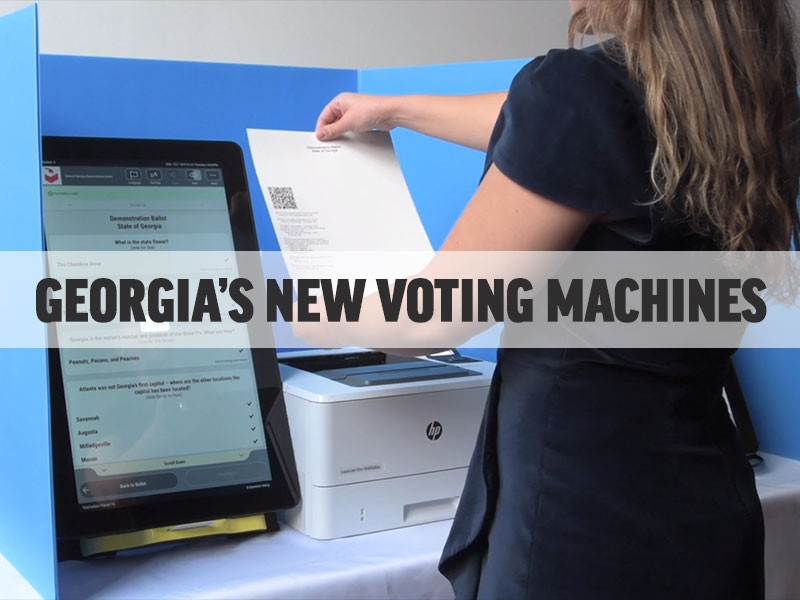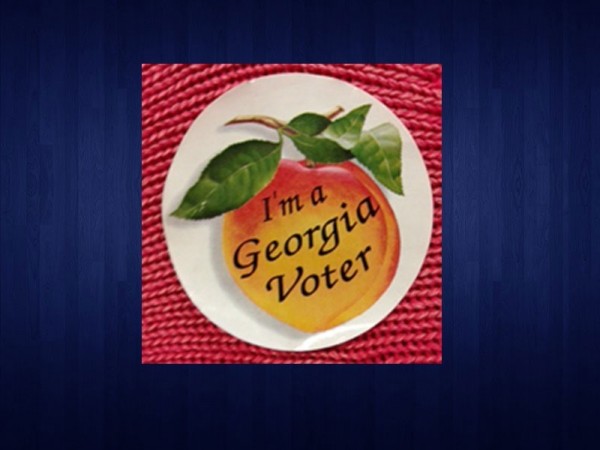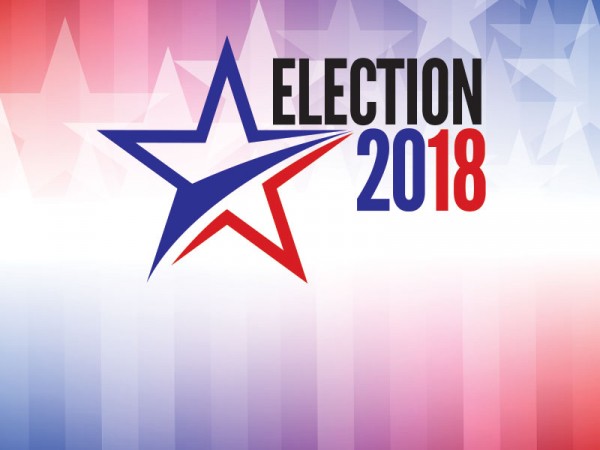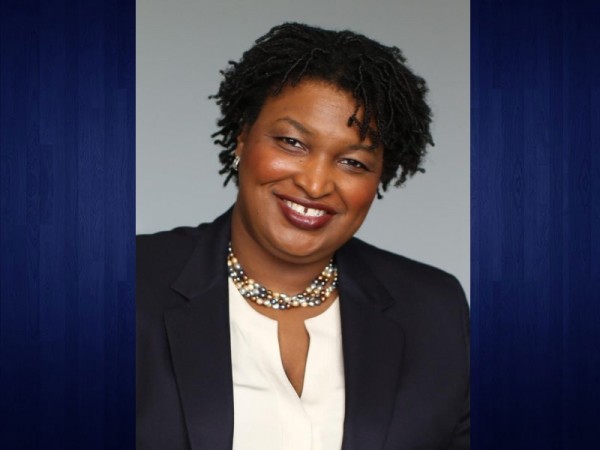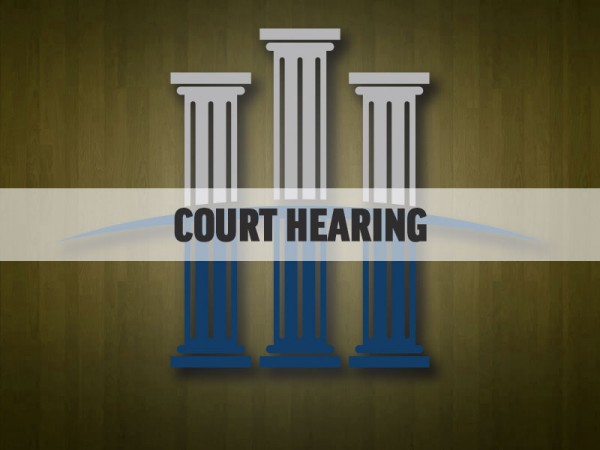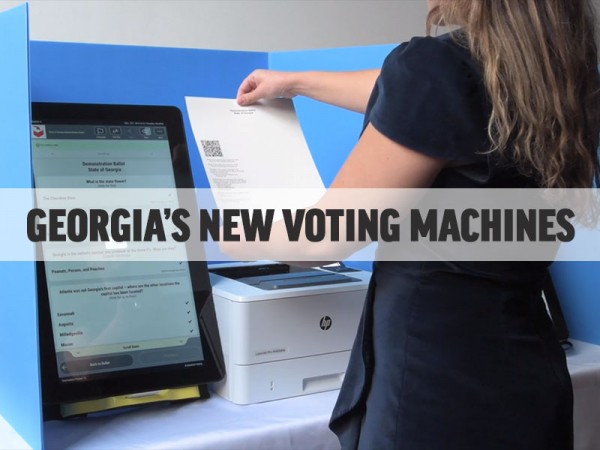ATLANTA (AP) Voting integrity activists will try this week to convince a federal judge that Georgia should scrap its brand new touchscreen voting machines in favor of hand-marked paper ballots. The state, meanwhile, will ask her not to order any changes, especially with an election looming.
A hearing scheduled for Thursday and Friday will be the latest skirmish in a long-running fight. A lawsuit filed in 2017 against state and county election officials that originally challenged the state's old, outdated voting machines has morphed to target the new machines and election system that Georgia bought last year for more than $100 million.
U.S. District Judge Amy Totenberg, who scolded state officials for failing to address serious problems with the old system, said the purchase of a new system was a step in the right direction. Now she must decide whether the new system places an unconstitutional burden on the right to vote.
The election integrity activists say the new voting machines are unaccountable and unverifiable and have many of the same security vulnerabilities as the old ones, despite Totenberg's warnings that the state must have a secure and reliable voting system.
State officials argue the new machines have been thoroughly tested and that security measures will prevent problems. They say the activists are seeking changes through the courts after failing to get the outcome they wanted in the legislative process. They also argue the U.S. Supreme Court has cautioned lower courts against ordering changes close to an election.
The activists have sought help from the courts for years. They argued in 2018 that the touchscreen voting machines Georgia had been using since 2002 were vulnerable to hacking and provided no way to confirm that votes were recorded correctly because they lacked a paper trail. They asked Totenberg to order a switch to hand-marked paper ballots for the midterm elections.
Lawyers for the state argued that switch would be difficult, costly and would cause chaos.
In an order on Sept. 18, 2018, Totenberg said the activists had demonstrated ``the threat of real harms to their constitutional interests,'' but she said forcing a change to hand-marked paper ballots less than two months before an election was too risky.
Totenberg's ruling had harsh words for the state, saying election officials had ``buried their heads in the sand,'' failing to address serious problems with the voting system that had long been evident. She warned that ``further delay is not tolerable.''
In the next legislative session, lawmakers authorized the purchase of a new election system to include ballot-marking machines that print a paper ballot. Secretary of State Brad Raffensperger in July 2019 announced the purchase from Dominion Voting Systems and vowed to have it ready for voters to use by March 2020.
With the state still planning to use the old system for some special and municipal elections in the interim, the voting integrity advocates asked Totenberg to order the state to immediately stop using the old system and to use hand-marked paper ballots instead.
On Aug. 15, 2019, Totenberg, once again, declined to order a switch to hand-marked paper ballots, citing worries about election officials' capacity to manage an interim switch while also implementing the new system on a tight timeline. But she prohibited the state from using the old system past the end of 2019 and ordered election officials to use hand-marked paper ballots if the new system wasn't ready in time for the presidential primary.
She also again offered scathing criticism, devoting a considerable portion of her 153-page order detailing the state's shortcomings in addressing concerns about its voting system. The state, she wrote, has ``minimized, erased, or dodged the issues underlying this case.''
In mid-January, with the March primary date fast approaching and many counties still awaiting delivery of the new voting machines, the activists urged Totenberg to order a more concrete backup plan. Lawyers for the state assured the judge they were on track to meet their deadlines.
Totenberg told both sides during a conference call that she didn't consider herself a ``guarantor'' for Georgia's election system roll-out.
``It may end up being a mess,'' she said during the call. ``But that's on their heads at that point.''
The primary elections were moved to June because of the coronavirus pandemic, with a runoff in August. The June election was marred by problems, including long lines and polling places that opened late in 20 counties.
Lawyers for one set of plaintiffs said the new system has proven to be ``spectacularly chaotic and unreliable.'' Lawyers for the other set of plaintiffs, including the Coalition for Good Governance, argue that allowing the November election to proceed on the new system would result in ``a colossal train wreck for democracy, which will leave counties and the State utterly unable to defend their election results against charges of fraud and error.''
The new touchscreen voting machines print a paper ballot with a human-readable summary and a barcode that is read by a scanner to tally the votes. But voters can't be sure that the barcode read by the scanner accurately reflects their selections, the activists argue. Many voters also don't take the time to check the human-readable part, making meaningful audits impossible, they say.
The new system has many of the same security vulnerabilities as the old system, and equipment malfunctions inadequate poll worker training contributed to the long lines during the primary, the activists argue. The scanners also fail to count some valid marks on hand-marked absentee ballots, they say.
Switching to hand-marked paper ballots would be easy because that's already the backup in place in case of emergencies, like equipment failures, they argue.
State officials argue that the activists have failed to identify any specific problems with the new voting machines and haven't identified any active security risk or hacking potential. Now they're asking the federal judge to overstep her authority and wade into a process governed by state law, the state says.
With the November election ``practically already underway,'' switching at this point would be too costly and disruptive, the state argues.
Monday
November 25th, 2024
6:52PM


